- Home
- Conn Iggulden
The Gods of War Page 16
The Gods of War Read online
Page 16
Labienus saluted and rode clear to give the orders. The legionaries who had already begun to huddle together in expectation of a meal were called to their feet by centurions. Labienus chose not to hear the muttered complaints of the rank and file as he rode through to pass the word to the officers. Soldiers loved to criticize the hardship of their lives, he knew, but these were experienced men and it was almost out of habit rather than any real feeling. From the beginning, they had known a winter campaign would be a test of their fitness and endurance. He did not expect them to fail.
As the great column began to move, Brutus rode back past the lines of scouts, his silver armor drawing the eye of Pompey’s officers. He was flushed with some emotion and rode with effortless skill. Pompey saw him approach and his expression became subtly tauter, his mouth a pale line in the tanned skin.
Brutus drew up beside Pompey’s horse, saluting quickly. “Sir, my men are ready to attack. With your order, I will let them loose.”
“Return to your position, General,” Pompey replied, wincing as his stomach spasmed. “I will not send a charge over ground he has had time to prepare.”
Brutus showed no reaction to the dismissal. “He’s moving now, sir, and that is a mistake. He hasn’t had time to trap the whole area.” Pompey’s expression did not change and Brutus spoke more urgently. “He knows us both, sir. He will expect us to wait and judge his plans before we strike. If we go in now, we can wound them before it gets dark. By the time we must withdraw, we will have raised morale with a victory and damaged his confidence.”
When Brutus finished, Pompey made a small gesture with his hand on the reins. Labienus took the cue, riding up to Brutus’s right side.
“You have your orders, General,” he said.
Brutus glanced at him and for an instant Labienus stiffened at what he saw there. Then Brutus saluted once more and rode back to the front ranks.
Pompey drummed his fingers on the high pommel of his saddle, a sign of the tension Brutus had created. Labienus did not break the silence of the march, allowing Pompey the privacy of his own thoughts.
The scouts reported every hour to keep them on course when line of sight became impossible for the main force. The winter night was coming quickly and Pompey waited with growing impatience for the enemy legions to call a halt.
“If they don’t stop soon, they will be spending the night in the open,” Pompey said irritably. “Half of them will freeze to death.”
He squinted through the shadows of trees into the distance, though there was nothing visible. The enemy had vanished in the gloom, but the most distant of the scouting riders still reported their progress back down the line. Pompey clenched his jaw against the cold and wondered if this too was a test. Perhaps Julius was hoping to lose them, or simply march them to death over the Greek plains.
“They may have already prepared a camp, sir,” Labienus said.
His lips were numb and he knew Pompey would have to let the men rest or start seeing them drop. He smothered any sign of his irritation as Pompey rode on as if unaware of the suffering of those around him. He did not want to prompt his commander, but if they did not make camp soon they risked losing the edge they had worked so hard to gain.
The sound of galloping hooves distracted both men from their thoughts and the cold. “They have halted, sir!” the scout reported. “A small party are riding toward us.”
Pompey raised his head like a dog with a scent. “How many?” he demanded.
Even in the last gray light, Labienus could see the scout was frozen to the point of barely staying in the saddle. He moved his own horse closer and took the reins from the younger man’s stiff fingers. “Your general asked you how many were coming,” he said.
The scout blinked, summoning his wits. “Three, sir, under a flag of truce,” he replied.
“Order a hostile camp, Labienus,” Pompey said, at last. “I want high walls around us by the time they arrive. No doubt they will report every detail to Caesar on their return. Let there be nothing out of place.” He paused and straightened his back to conceal his discomfort. “Send my physician to me. I need a little of his chalk and milk to settle my stomach.”
Labienus sent men running to fulfill the order. Weary and cold as they were, the army of fifty thousand would make short work of the walled camps. It was almost second nature to them after so long in training, and he was pleased as the squares began to take shape. The sound of axes chopping into trees was as familiar as home to him, and he began to relax. Pompey had left it late, Labienus acknowledged to himself. Part of the work would be finished in the dark and there would be accidents.
The three men Caesar had sent to speak to Pompey worried him far more. What was there to say at this late stage? It could not be to surrender before a single spear had been thrown in anger. Labienus grimaced in the gloom as he considered sending a few of his cavalry out to make the group disappear. He did not fear the consequences, knowing that if the bodies were well hidden, Pompey would think it had been a ruse, or a delaying tactic. Labienus had loyal men he could trust to kill them in the dark and then it would just be another tiny mystery, quickly forgotten.
The alternative was to feed what he now saw as Pompey’s fear of this enemy. The confidence that had drawn Labienus to him on their first meetings seemed to have vanished with the news of the landing at Oricum. Labienus had seen the way he pressed a hand into his stomach, and he feared the sickness was affecting more than his health and temper. Pompey had aged before them all and Labienus was faced with a role as second in command that went far beyond anything he had expected.
He was on the point of calling men he knew over to him when one of the scouts reported. The three riders had reached the mile perimeter and were being escorted in. Labienus let his hand fall, irritated that his own hesitation had stolen the chance. Perhaps that was the secret of Caesar’s genius, he thought, a wry smile tugging at his mouth. Those who faced him tied themselves in knots guessing what he would try next. Labienus wondered if he would prove as vulnerable as Pompey seemed to be and took heart from the city of soldiers they had brought out of the north. No matter what cleverness Caesar summoned to the field, he had never faced Roman legions in their full strength. Gaul would not have prepared him for their onslaught.
By the time the three riders appeared out of the darkness, the camps were taking shape. Thousands of legionaries had dug trenches and banked earth to the height of two men. Every tree for miles around had been cut and pegged, sawn and strapped into place. Banks of earth and grass sod buttressed the columns, proof against fire and enemy missiles. They built fortresses out of nothing in just hours, havens of order and safety in the wilderness. Torches stood on iron stands all around the camp and lit the night in flickering yellow. Labienus could smell meat cooking on the night wind and his empty stomach creaked. His own needs would have to wait a little longer and he forced down his body’s weakness.
He waited for the three riders as they were passed through the scout lines into the camp, noting the insignia of the Tenth legion and their centurion’s armor. Julius had sent senior men to speak to Pompey, Labienus observed. They had been forced to walk through the defensive rings with drawn blades at their backs. Labienus watched them with narrowed eyes. At his order, their horses were taken and the three soldiers quickly surrounded.
Labienus walked across the frozen ground toward them. They exchanged a glance as he approached, and their leader spoke first.
“We have come at the order of Gaius Julius Caesar, consul of Rome,” he said. The centurion stood confidently as if he were not ringed with men willing to cut him down at the first sudden move.
“You seem a little blunt for diplomacy, soldier,” Labienus replied. “Speak your message, then. I have a meal waiting.”
The centurion shook his head. “Not to you, Labienus. The message is for Pompey.”
Labienus regarded the men, his face showing nothing of his irritation. He had not missed the fact that his name was kno
wn to them and wondered how many spies Caesar had in Greece. He really should have had them killed before they had reached his position, Labienus thought ruefully.
“You may not approach the general with weapons, gentlemen,” he said.
They nodded, and removed swords and daggers, letting them fall at their feet. The wind howled around them and the nearest torches fluttered madly.
“Remove the rest of your clothes and I will have more brought to you.”
The three men looked angry, but they did not resist and were soon shivering and naked. Their skins showed each of them had fought for years, collecting a web of scars. The man who had spoken had a particularly fine collection and Labienus thought Caesar must have excellent healers for him to have survived. They stood without embarrassment and Labienus felt a touch of admiration at how they refused to hunch against the cold. Seeing their arrogance, he considered ordering a more intimate search, but decided against it. Pompey would be wondering about the delay as it was.
Slaves brought rough wool shifts, which the centurions draped over their skins, already turning blue.
Labienus examined their sandals for anything unusual and then shrugged and tossed them back.
“Escort them to camp one—to the command tent,” he said.
He watched their faces closely, but the men were as impassive as the soldiers around them. Labienus knew his meal would have to wait a little longer. He was too curious to find out why Caesar would send valuable men to such a meeting.
Camp one contained eleven thousand soldiers and the key links in the command chain. It was surrounded by four others of similar size, so that from above they would look like the petals of a flower drawn by a child. Three roads crossed the heart of the camp and as Labienus walked along the Via Principalis toward Pompey’s command tent, he noted how the centurions took in every detail around them. He frowned at the thought that they would carry their observations back to an enemy and once again considered having them quietly dispatched. Rather than waste another chance, he broke away from the escort and gave quick instructions to a tribune from his own Fourth legion. Without hesitation, the man saluted and went to gather a dozen others for the task. Labienus hurried along the main road to catch up with Caesar’s men, feeling better about their mission.
The praetorium tent was an enormous leather construction near the northern gate of the camp. Reinforced with beams and taut with ropes, it was as solid as a stone building and proof against rain or gale. The whole area was well lit with oil torches partially shielded by a lattice of iron. Their flames streamed out with the wind, casting odd shadows as Labienus reached his men and had them halt outside. He gave the password of the day to the outer guards and ducked inside, finding Pompey in discussion with a dozen of his officers. The tent was simply furnished, with one long table and an ornate oak chair for Pompey. Benches rested against the walls for meetings and it had a spartan air of which Labienus approved. More important, the tent was far warmer than the outside. Braziers glowed on the packed earth, making the air thick and sluggish with heat. Labienus felt sweat break out on his skin at the sudden change.
“You’ve brought them here?” Pompey asked. His hand crept toward his stomach as he spoke.
“I’ve stripped and searched them, sir. With your permission, I will have my men bring them in.”
Pompey gestured to the maps that lay across a heavy table and one of the officers quickly gathered them into neat scrolls. When there was nothing important visible, he seated himself carefully, twitching his toga into perfect folds over his legs.
The three centurions held themselves well as they came into Pompey’s presence. Even dressed as they were, their short-cropped hair and scarred arms marked them immediately for what they were. The escort kept their weapons bared as they took positions around the walls of the tent and left the three men facing Pompey. Labienus found himself breathing more heavily as he waited, his hunger forgotten.
“So tell me what Caesar has to say that is so important as to risk your lives,” Pompey said.
In the silence, only the crackle of the braziers could be heard.
The centurion who had spoken before took a step forward and, as one, the guards in the tent went from stillness to a knife edge of danger. He glanced around at them and raised his eyes for a moment as if he was amused by their stance.
“My name is Decimus, sir. Centurion of the Tenth legion. We have met once before, in Ariminum.”
“I remember you,” Pompey said. “At the meeting with Crassus. You were there when Caesar brought gold back from Gaul.”
“I was, sir. Consul Caesar preferred to send a man you would recognize to show his good faith.”
Despite the neutral tone, Pompey colored with anger immediately. “Do not use a false title in my presence, Decimus. The man you follow does not have the right to claim consul in front of me.”
“He was elected by the voting centuries, sir, in accordance with the most ancient traditions. He claims his authority and rights as given him by the citizens of Rome.”
Labienus frowned, wondering what Decimus could hope to achieve by antagonizing Pompey so early in the meeting. He could not escape the worrying thought that the words were intended for the other men there, who could be counted upon to discuss them with friends and colleagues. As if he shared the suspicion, Pompey glanced around the men in the tent, his eyes narrowing.
“As Dictator, even false consuls are answerable to my orders, Decimus, but I suspect you are not here to argue that point.”
“No, sir. I have been ordered here to request that soldiers loyal to Rome leave this camp and either quit the field or join Caesar’s legions against you.”
There was immediate uproar. Pompey rose from his seat and at his signal all three men were hammered to their knees by the guards closest to them. None of them made a sound. Pompey controlled himself with difficulty.
“Your master is insolent, Decimus. There are no traitors here.”
Decimus looked a little dazed from a blow to the back of his head. He raised a hand to rub where he had been struck and then thought better of the action. The guards around him were eager to cut him down at any provocation.
“In that case, I have his authority to offer peace, sir. For the good of Rome, he asks that you listen.”
Pompey remembered his dignity with difficulty. He raised his hand in preparation for ordering the deaths of the centurions, and Decimus watched its movement, his eyes glittering in the light of the torches.
“Be warned, Decimus,” Pompey said at last. “I will not be rebuked in my own camp. Choose your words carefully or you will be killed.”
Decimus nodded. “Caesar wishes it to be known that he serves Rome above his own safety or ambition. He does not wish to see her armies broken against each other and so leave the city poorly defended for a generation. He offers peace, if certain conditions are met.”
Pompey clenched the fist he held up and one of the men with Decimus flinched slightly, expecting to feel cold iron in his back at any moment. Decimus did not respond to the threat, and as Pompey held his gaze they all heard voices raised outside the tent.
An instant later, Cicero entered with two other senators, sweeping into the warmth with crystals of ice on their cloaks. They were pale with the cold, but Cicero took in the scene before him immediately. He bowed to Pompey.
“General, I have come to represent the Senate at this meeting.”
Pompey glowered at the old man, unable to dismiss him while the three centurions watched.
“You are welcome, Cicero. Labienus, draw up a bench for the senators, that they may witness the impertinence of Caesar.”
The senators settled themselves and Decimus raised his eyebrows in inquiry. “Should I repeat myself, General?” he said.
His calm was unnatural for a man with sharp iron at his neck, and Labienus wondered if he had chewed one of the roots that were said to dull fear. Pompey resumed his seat and his long fingers fussed with the lines of his
toga while he thought.
“Caesar has offered peace,” he said to Cicero. “I suspect it is yet another attempt to sow discord amongst our men.”
Decimus bowed his head for a moment and took a deep breath. “My master claims the rights granted him by the people of Rome in lawful election. With those rights, he accepts the responsibility to avoid a war if it is possible. He fears that a conflict between us would leave Greece stripped and Rome undefended. He thinks first of Rome.”
Cicero leaned forward like an old hawk. “But there is a sting to be borne, yes? I would not expect Caesar to brave our fleet to reach Greece and then meekly give up his ambition.”
Decimus smiled. “No, Senator. He looks for a peaceful resolution only because he would not see Rome weakened.”
“What does he offer?” Cicero said.
Pompey flushed at the old man’s interruptions, but pride prevented him from showing his anger in front of his most senior officers.
As if he sensed Pompey’s discomfort, Decimus turned away from Cicero and addressed Pompey directly. “Caesar offers a truce between the two armies. No man will be punished or held responsible for his officers at this time.”
He took another deep breath and Labienus tensed, sensing the strain Decimus was under.
“He asks only that Pompey take a small honor guard and leave Greece, perhaps to peaceful allies. His army will return to their posts and no harm will come to them for taking arms against the lawfully elected consul of Rome.”
Pompey rose once again, standing over the kneeling men. His voice was choked with fury. “Does your master think I would accept a peace under those terms? I would rather be ashes than take my life at his generosity!”
Labienus looked around at the other men in the tent. He was bitter with regret and knew he should have had the men killed before they could reach Pompey. Who could tell what damage the offer might achieve by the time it had spread to the lowest ranks?

 The Khan Series 5-Book Bundle
The Khan Series 5-Book Bundle Tollins 2: Dynamite Tales
Tollins 2: Dynamite Tales Tollins: Explosive Tales for Children
Tollins: Explosive Tales for Children The Field of Swords
The Field of Swords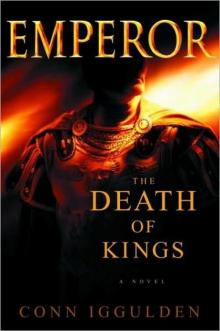 The Death of Kings
The Death of Kings Quantum of Tweed: The Man With the Nissan Micra
Quantum of Tweed: The Man With the Nissan Micra Bones of the Hills
Bones of the Hills Genghis: Birth of an Empire
Genghis: Birth of an Empire The Gates of Rome
The Gates of Rome Dunstan
Dunstan Fig Tree
Fig Tree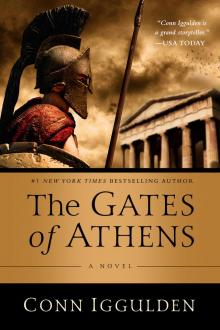 The Gates of Athens
The Gates of Athens Stormbird
Stormbird Khan: Empire of Silver
Khan: Empire of Silver The Abbot's Tale
The Abbot's Tale Gengis: Lords of the Bow
Gengis: Lords of the Bow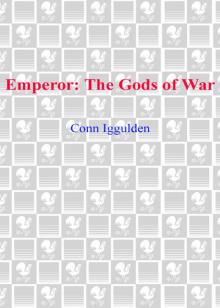 The Gods of War
The Gods of War Blackwater
Blackwater Ravenspur: Rise of the Tudors
Ravenspur: Rise of the Tudors Wars of the Roses: Trinity (War of the Roses Book 2)
Wars of the Roses: Trinity (War of the Roses Book 2) The Gods of war e-4
The Gods of war e-4 The Dangerous Book of Heroes
The Dangerous Book of Heroes Stormbird wotr-1
Stormbird wotr-1 Emperor: The Death of Kings
Emperor: The Death of Kings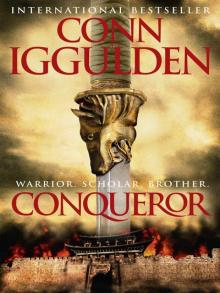 Conqueror (2011) c-5
Conqueror (2011) c-5 The Dangerous Book for Boys
The Dangerous Book for Boys Genghis Lords of the Bow
Genghis Lords of the Bow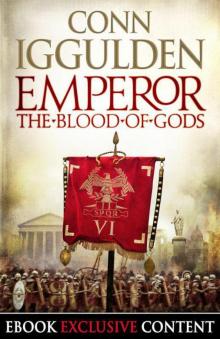 Emperor: The Blood of Gods (Special Edition) (Emperor Series, Book 5)
Emperor: The Blood of Gods (Special Edition) (Emperor Series, Book 5) The Emperor Series: Books 1-5
The Emperor Series: Books 1-5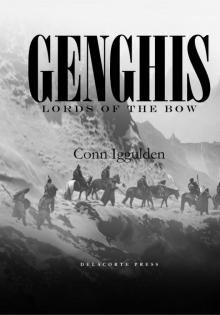 Lords of the Bow c-2
Lords of the Bow c-2 Lords of the Bow
Lords of the Bow Quantum of Tweed
Quantum of Tweed Wars of the Roses 01 - Stormbird
Wars of the Roses 01 - Stormbird Empire of Silver c-4
Empire of Silver c-4 Birth of an Empire
Birth of an Empire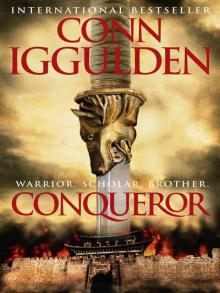 Conqueror (2011)
Conqueror (2011) Wars of the Roses: Bloodline: Book 3 (The Wars of the Roses)
Wars of the Roses: Bloodline: Book 3 (The Wars of the Roses) Bones Of the Hills c-3
Bones Of the Hills c-3 Empire of Silver
Empire of Silver The Khan Series 5-Book Bundle: Genghis: Birth of an Empire, Genghis: Bones of the Hills, Genghis: Lords of the Bow, Khan: Empire of Silver, Conqueror
The Khan Series 5-Book Bundle: Genghis: Birth of an Empire, Genghis: Bones of the Hills, Genghis: Lords of the Bow, Khan: Empire of Silver, Conqueror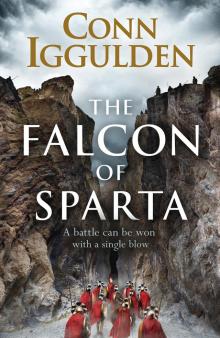 The Falcon of Sparta
The Falcon of Sparta Explosive Tales for Children
Explosive Tales for Children